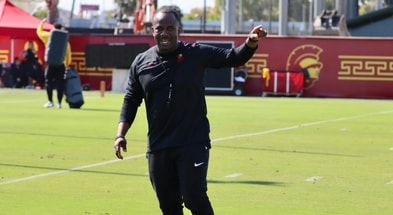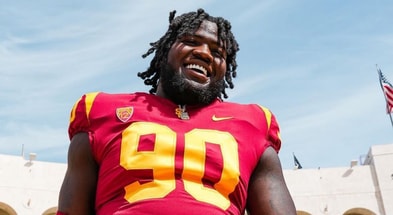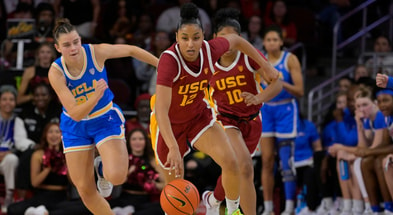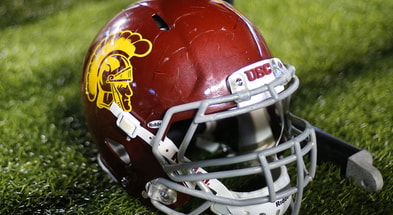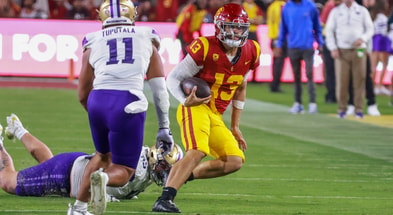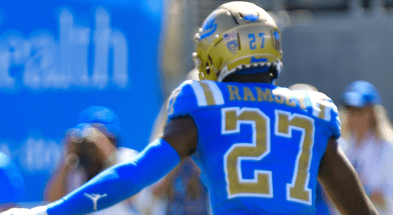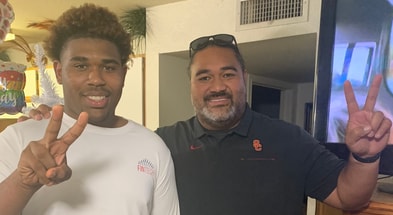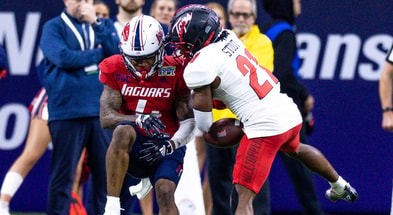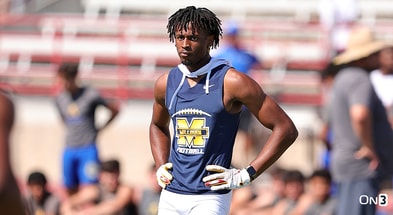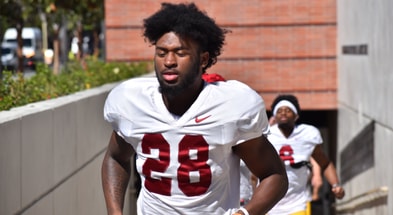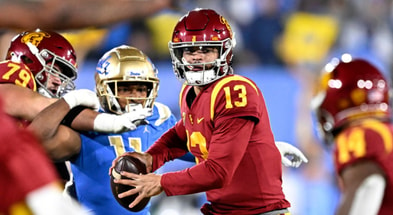Musings from Arledge: Coronavirus questions, and Jordan the jerk
For the most part, being a child is a pretty good gig. It’s a time of wild optimism; you can still genuinely believe that you’re on your way to a career as an astronaut or center fielder for the Dodgers. It’s a time of a relative lack of responsibility; sure, you might have homework or chores, but your success or failure probably doesn’t determine whether the people around you live or die, eat or starve, succeed or fail. Like I said, not too bad.
The primary downside is that you can’t make decisions for yourself. You need permission and often help to do just about anything, and these shackles restricting your movement, conduct, and freedom are irritating.
To a large extent, we have all been reduced to such a state once again, as COVID-inspired lockdowns have dictated where we can go and what we can do. And being that these restrictions affect just about every aspect of our lives, it is no surprise that university presidents, athletic directors, and conference commissioners are now trying to decide what will happen with the college football season.
Most of us have little ability to sway the elected officials (or unelected bureaucrats) who make decisions for us. But university presidents, major media organizations, network executives, and the other stakeholders in college football have the platforms and the stature to make their views known, to get the attention of major politicians, and to get answers to important questions.
I think they should. I think college football’s stakeholders should be demanding answers to some pretty important questions.
Why? Because we are a free people, who are owed certain human and constitutional rights – such as the right to assembly – that cannot be taken from us except in exceptional circumstances and for compelling, narrowly tailored reasons. Now I understand that not everybody reading this Musings comes to the problem with the same political philosophy I do. And that’s okay. Because I’m not arguing that the lockdowns are wrong or unlawful, and I’m not staking out a political position.
What I am saying is that we’re free people – adults, not children – and therefore we’re entitled to answers from officials when they assert that an emergency requires them to treat us otherwise. It means that our elected leaders must justify their orders with strong justifications. We’re entitled to know why we’re precluded from going to a restaurant, or the beach, or church or, yes, a college football game.
The debate on the efficacy and necessity of the lockdowns is ongoing and will only get louder. I’m willing to assume that people on both sides of the debate have valid, reasonable arguments and a good-faith basis for their beliefs. Yes, that’s a major concession in 2020 when we all know the other guys are not just wrong but stupid and maybe evil. Still, that’s my starting point.
So I’m willing to concede that other reasonable people can disagree with my position. What I’m not okay with is the lack of a reasoned debate on the subject. I think we need to ask questions and get the best answers possible.
So let’s start with the big question: what is the current goal of the lockdowns and other restrictions? Initially, the stated purpose of the lockdowns was to flatten the curve – to slow down the rate of infection – so that hospitals would not be overwhelmed. The assumption was that the virus would still spread; the lockdowns were never going to stop the virus from eventually spreading everywhere, and it was always assumed that many people would get sick and die. But by spacing out the timing of the inevitable infections, we could better treat the victims, and we could save lives.
Is that still the goal?
If the goal has changed, if lockdowns will remain in place until we have a vaccine (or until magic fairy dust or term limits lets our current political leaders off-the-hook), then the goal posts have moved, and we should be told that directly.
To bring the discussion back to the issue at-hand, we may never have a vaccine, or it may be many years in the making. Is college football to be cancelled forever under those circumstances? If the vaccine process takes many years, will we cancel this season and maybe one or two more and then decide, “Ah to hell with it, I guess we can’t wait for the vaccine after all” and start playing again?
Or if the original purpose of the restrictions is still valid, if the purpose is simply to avoid overwhelming hospitals, is there reason to believe that large crowds at football stadiums will result in hospitals being overwhelmed? If so, prohibiting fans from attending football games may very well be justified. But we should see the evidentiary basis for concluding that crowds at football stadiums will overwhelm our hospitals. Aren’t we entitled to see the basis for our elected leaders’ decisions on things like this? If the hospitals are not likely to be overwhelmed, then can we make our own decisions on whether to attend – you know, like free citizens in a republic who generally are free to make their own decisions?
And let’s assume for a minute that large crowds might lead to the rapid spread of the virus and hospitals may not be able to keep up. That’s plausible. So let’s assume that banning large crowds is therefore justified.
What, then is the justification for prohibiting college football games without fans or with very few fans, who are seated far apart so that – in an outdoor arena, especially – those few fans can comply with social-distancing guidelines? Do our political leaders have a sound basis to conclude that a game played by 150 very young, very healthy athletes will result in substantial hospitalizations and deaths? Would USC versus Notre Dame at the Coliseum sans fans overwhelm the medical resources of Los Angeles?
The data is pretty clear that healthy 18-22 year olds are at almost no risk from the virus. But you know what is dangerous? Football. Cancelling a football game between healthy young people because of COVID doesn’t strike me as particularly rational. The disease is less risky for them than is the disease-free activity.
But if I’m wrong, and if healthy young people playing a game without fans is extraordinarily risky then, as my math teachers in school used to say, I want to see the work. If governors are going to bar such events, aren’t we at least entitled to a reasoned justification with evidence?
Can somebody get answers to these questions? I can’t. Governor Abbott doesn’t return my emails. I’ve tried. I don’t expect Governor Newsom or Governor Cuomo to do so either. But I bet Carol Folt could get a response. I’d sure like to see her try and then tell all of us the answer.
And I have a question for the people running the Pac 12. A conference-only season? Really? So LAX to Seattle by plane, a distance of 954 miles, is okay, but LAX to DFW by plane, a distance of 1,234 miles, is foolhardy? Is it the last 400 miles that get you? Are flights of two hours and 18 minutes safe but flights of two hours and 50 minutes deadly? What if we land in El Paso and drive the rest of the way? Then are we in the clear?
These aren’t idle questions. If there’s a medical justification for this conference-games-only gibberish, I’d love to see it. I’m no epidemiologist, but I’d like to muddle through that report if you have one handy, guys.
See, because I think something very different is going on. I think the Pac 12 is planning to cancel the season and wants to give the other conferences a chance to make alternative plans for their non-conference games before that happens. And I think we’re going to meekly cancel the Pac 12 football seasons without actually pushing our elected leaders for a clear statement of the purpose of the current restrictions and an explanation of why the restrictions are a necessary and narrowly tailored means of achieving that purpose. And I think the Pac-12 is going to do that because its leaders are afraid of looking insensitive and therefore are not willing to get a real explanation from the people calling the shots.
And I don’t think that’s okay.
Like many of you, I’ve been watching The Last Dance on ESPN. It’s been fascinating to relive that period in sports history and to see so many behind-the-scenes moments that we’ve never seen before.
But the series also raises some interesting issues about how people should behave, especially how stars should behave. Michael Jordan became the world’s most-popular athlete and a role model for young athletes everywhere.
And in some important ways, that’s a shame.
The Last Dance, of course, was controlled by Michael Jordan, who owned the footage and unfortunately had the ability to shape the documentary. I don’t think we’re getting the full picture of the real Michael Jordan, but even so, the real Michael Jordan still seeps out. The real Michael Jordan was one of the fiercest competitors of all time, a once-in-a-generation talent who also had a once-in-a-generation work ethic. And who was probably a once-in-a-generation jerk.
I have no problem with Jordan trash talking Magic and Barkley in Dream Team practices. I have no problem with him going after Bird or Isiah in playoff games. But mocking and belittling NBA journeymen teammates in practice? You shouldn’t punch down like that; it’s classless and embarrassing. The fact that his teammates are still walking on egg shells talking about him 30 years later tells me all I need to know.
Would any of us feel good about seeing Mike Williams or JuJu Smith-Schuster mock and humiliate a walk-on corner in practice until the kid was at the point of tears? Of course not. That would be ridiculous behavior. And, apparently, it was Michael Jordan’s typical behavior. Nor would we be proud to see one of USC’s stars publicly mocking an athletic department official from Heritage Hall because of the guy’s weight problem the way Jordan constantly mocked Jerry Krause.
Let’s stop pretending that Jordan’s belittling of his inferiors was a sign of his greatness as a competitor. That was Jordan being a bad guy, and I hate that young athletes might be learning some bad lessons from watching his behavior.
His teammates and the filmmaker might be unable to tell the truth. But we can. Michael Jordan: amazing athlete … and a bully and a jerk.
Carthago delenda est.
